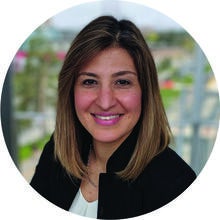
Educating the urban engineers of the future
The Turkstra Chair in Urban Engineering is preparing tomorrow’s municipal leaders.

The Turkstra Chair in Urban Engineering is preparing tomorrow’s municipal leaders.
By Megan Vander Woude Office of AdvancementCreated by donor Carl Turkstra, the position will help align civil engineering programs with the world’s need for municipal leaders.
Today, more than half the world’s population lives in cities, and that number is only increasing. Tomorrow’s urban centres will face rapid population growth and increasingly complex challenges. The Turkstra Chair in Urban Engineering was created to prepare students for the difficult issues that our future cities will face. The newly-appointed Chair, Nadine Ibrahim, took the position in January 2019. Through unique coursework and extracurriculars, she’s introducing new educational attitudes that will help students learn from a network of faculty, industry professionals and global experts.
 “My vision is to make Waterloo a hub where urban experts come together,” she says. “Our future cities need urban engineers who collaborate with others in the face of ground-breaking, complex challenges.”
“My vision is to make Waterloo a hub where urban experts come together,” she says. “Our future cities need urban engineers who collaborate with others in the face of ground-breaking, complex challenges.”
Nadine has already implemented a number of student opportunities – discussion groups, industry seminars, and collaborative design challenges – and plans to create more in the future.
“Cities have many different components that come together to make a whole,” says Nadine. “They are inherently interdisciplinary, and they are getting more complex. The future won’t just require engineers, it will require engineers collaborating with others in the face of a challenge.”
Communication, collaboration and leadership will be key skills for tomorrow's urban engineers. To build these skills, Nadine is creating peer-to-peer learning opportunities, where students can share their knowledge and work together. One of these programs is a weekly discussion group, where students explore cities from around the world. Every week, the group learns about the urban world, one city at a time.
“I call it City Circle because we sit in a circle to discuss together,” says Nadine, who was inspired by Indigneous learning circles. “This is not a lecture. We sit in a circle so there is no teacher at the front of the room; I’m just a facilitator, encouraging them to learn from one another.”
NADINE IBRAHIM, Turkstra Chair in Urban Engineering
The future won't just require engineers, it will require engineers collaborating with others in the face of a challenge.
Luckily, Nadine isn’t new to this style of teaching. She previously created an online course and piloted a global classroom, where students learned about infrastructure and urban issues from each other. She also worked with global students in an online course about environmental entrepreneurship and social innovation, in collaboration with a not-for-profit organization.
“It was a global classroom, so students from Toronto took the course with students from three African universities,” she explains. “The learning was not just instructor to students, but also valuable learning between students. Through a discussion forum, they taught each other about their own locations.”
She plans to offer similar opportunities to Waterloo students.
Waterloo’s co-op program provides a solid foundation for students’ learning, helping them understand and apply the knowledge they gain in class. The real-world experience is critical preparation, and Nadine plans to increase students’ exposure to industry practices.
“There’s so much value in bringing today’s knowledge from cities into their course material, by way of case studies or showcasing real-world projects,” she says.
By bringing municipal leaders – like city managers, planners and infrastructure service providers – into the classroom, students will gain industry knowledge during both co-op and study terms.
NADINE IBRAHIM
If I’m successful, more students will want to work in the cities that need them. They’ll see great opportunity in municipal work, and they’ll be inspired to create exciting careers.
To start, Nadine began a weekly lecture series, where students could meet and hear from industry professionals first-hand. In these lectures, students can learn about real-world challenges, practices and solutions. They also get the tremendous opportunity to make personal connections with potential employers and co-workers.
She’s also helping students put their knowledge into practice, with urban design days scheduled for winter 2020. The events are two-day experiences where students must collaborate to design an entire urban region. Open to students studying civil engineering, environmental engineering and planning, the events are built to be interdisciplinary and challenge students’ ability to communicate.
“Students will build their own neighbourhoods in small groups,” says Nadine. “In the next phase of the challenge, the small groups will assemble all their neighbourhoods together to create a connected urban region.”
By exposing students to difficult, real-world challenges, Nadine hopes to show students just how exciting urban engineering can be.
“The world of cities is always changing,” she explains. “If I’m successful, more students will want to work in the cities that need them. They’ll see great opportunity in municipal work, and they’ll be inspired to create exciting careers.”

Read more
How Doug Kavanagh’s software engineering degree laid the foundation for a thriving career in patient care

Read more
Upside Robotics secures new funding to accelerate the future of sustainable farming

Read more
Redefining capstone learning by bringing students, faculty and community partners together to tackle real-world challenges
The University of Waterloo acknowledges that much of our work takes place on the traditional territory of the Neutral, Anishinaabeg, and Haudenosaunee peoples. Our main campus is situated on the Haldimand Tract, the land granted to the Six Nations that includes six miles on each side of the Grand River. Our active work toward reconciliation takes place across our campuses through research, learning, teaching, and community building, and is co-ordinated within the Office of Indigenous Relations.